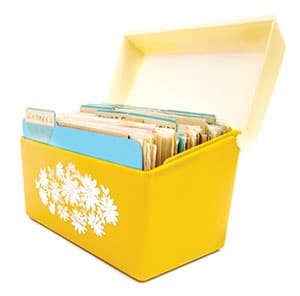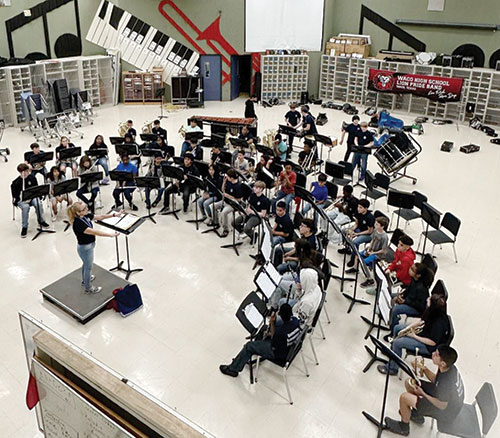
Ingredients:
A pinch of patience
A dash of diligence
A ration of relationship-building
A load of love
An ounce of organization
A portion of planning
A cup of communication
2 cups of classroom management
A course of consistency
There are many different recipes to create a successful music program, and you must find the one that meets the needs of your situation. You must also customize the above ingredients (adding the right amounts at the right times) and blend them in a way that fits your personality and those of your students and families.
All of the ingredients are essential for success at any level. Before starting to mix them, define success for you and your program. It is important to have a clear mission and vision for the program and to communicate that to everyone. Know your end goals and develop benchmark goals along the way. The following is a little bit about each ingredient that is included in the recipe.
Patience
This one can be difficult as all teachers want rapid improvement, but real change takes time. If it is really worth it, you have to wait for real results. When making changes, remember that change is difficult for most people. Patience will help in this process. Celebrate the small wins along the way, and before you know it, your goals will come to fruition. You may not even remember slow progress at the beginning.

Diligence
When working towards a goal, remember that it will take sacrifice and hard work. You have to be willing to work through the tough times and challenges. You can’t give up – even on the things that seem small. Persistent, careful work will get you to your goals. When you are modeling grit, determination and diligence, you will influence others to do the same. In the end, hard work pays off.
Relationships
It is impossible to build a successful band program alone. You need others to develop a culture and sustain momentum. You need help from people with strengths that compensate for your weaker skills. Relationship-building is key. Music programs with a tradition of excellence often feel like a family where everyone contributes. Everyone is part of the program, including students, band staff, parents, other family members and friends, administrators, fellow teachers and staff, and community members. Invite everyone to be involved, heard and celebrated. Show gratitude for those who are involved in your program at any level.
Some people feel uncomfortable with the vulnerable, emotional parts of developing relationships. When you open your heart and share your love of music, your program, and people, others will feel free to be vulnerable as well. Music is about expressing emotions through music. By openly showing love for your art, career, and students, you invite students to do the same. This approach can have a huge impact on everyone in the program and community.
Organization and Planning
If you struggle with staying organized, find someone to keep things on track. A music program often resembles a small business with many moving parts. You do a disservice to the entire program when there is not proper organization. By staying on top of things, you convey professionalism and trust will follow. You will also feel less stressed, a feeling that will spread to everyone around you.
Careful planning is an important component of organization. Build a master calendar as early as possible and complete any paperwork well in advance. Plan for every contingency with your team and work closely with others outside of the program to avert possible conflicts. For example, I collaborate with the fine arts team and coaches as I make my plans.
Be sure to consider the school’s master schedule. I include any special programs and school events that occur during the year on my calendar. Check district and state calendars to avoid conflicts such as testing dates. I do not want to discover a scheduling problem at the last minute that I have to scramble to solve. Because students are involved in a wide range of activities, I avoid making them choose between involvement in music and something else they deem just as important.
Communication
You must communicate in every way possible with every stakeholder in your program. Here are some essential ways to keep people informed:
• Develop an approved band handbook that is available to everyone. Make sure that all expectations are communicated in it. Provide parents and students with a way to acknowledge reviewing the material.
• Have band meetings in person and online for those who would receive your messages better coming from you. Record a beginning of the year band parent meeting and upload it to YouTube or your band website and provide a link to parents.
• Send weekly newsletters via email or Remind.
• Share as much as you are able on social media platforms.
• Send text messages.
• Start a parents group and recruit a smaller group of parents to help get band news out to everyone.
There is never enough communication. If some feel they are getting too much information, they can always opt out of one or more of the types of communication. You never want a student or parent to say, “I didn’t know…” Also, make personal phone calls as much as possible, particularly with good news or praise about a student. Document every communication that you have with individual students. Each school or district has a preferred method of documentation.
Classroom Management
You can be the most knowledgeable and talented musician in the room, but students won’t learn what they need to know without effective classroom management. Know ahead of time the procedures needed for every activity in your program. Make sure you communicate and practice these procedures with your students so there is no confusion.
Establish an attention signal that you use every time you need them to focus on you. My students know that there are clear consequences for not following procedures. I use a three strike approach – students get two warnings from me in a class period and then they pack up, complete a worksheet, and receive a participation grade of zero for the day. Parents also get a call from me.
It is important to avoid emotion with discipline. I simply look at a student not following procedures and tell them that they have a strike. I rarely have to give strike three, and every student has a clean slate at the beginning of each day.
Most students want to do well, but some may need help with the right way to succeed. You can show them how. Do not back down on what your goals are or what your expectations are. Your students must rise to the challenge and try to reach your expectations for them and the program.
Consistency
Hold yourself and students accountable using consistent expectations and procedures as you build a culture of excellence. If you initiate too many ideas and approaches and never follow through, it is difficult to see results. You can measure progress more effectively when following consistent actions. Consistency requires sustained effort until you achieve your goals.
Each ingredient in the recipe is important when building a successful band program. Over time, you will find just the right blend. Best of luck to you and your program in the new school year!






